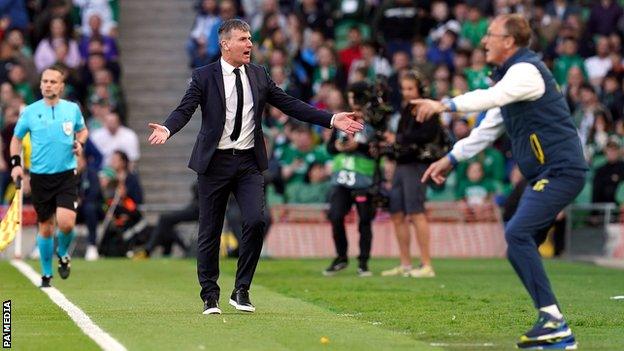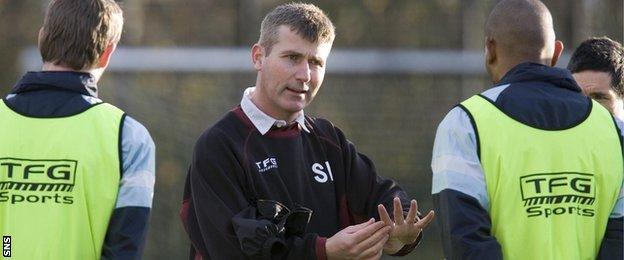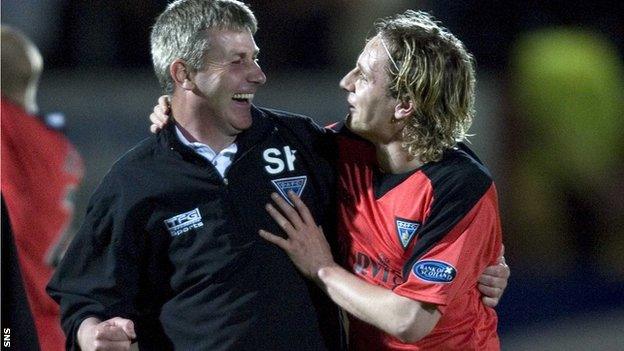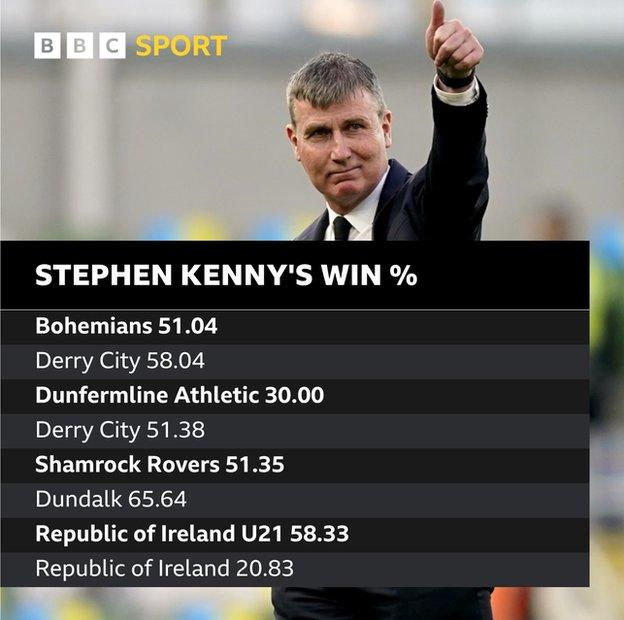Stephen Kenny: From down and out in Dunfermline to leading Republic revolution
- Published

Stephen Kenny is under pressure again after Wednesday's 1-0 defeat by Ukraine
Nations League Group B1: Republic of Ireland v Scotland |
|---|
Venue: Aviva Stadium, Dublin Date: Saturday, 11 June Kick-off: 17:00 BST |
Coverage: Listen on BBC Radio Scotland, live text commentary on the BBC Sport website & app, watch highlights on Sportscene |
Stephen Kenny is not your typical football manager - never mind one leading his country.
From being sacked by Dunfermline Athletic to his appointment by Republic of Ireland, the 50-year-old has battled against conventions and confounded his critics.
But now he prepares for Scotland's visit to his home city of Dublin on Saturday amid renewed question marks about his suitability for the job after two consecutive defeats at the start of their Nations League campaign.
Here we track his rise from dark days in the Kingdom of Fife to his present bid to make the Republic shine again.
From left-field to outcast in Fife

Some of Dunfermline Athletic's senior players did not take to Stephen Kenny's methods
Dunfermline were sitting second bottom in the Scottish Premier League when club legend Jim Leishman resigned in October 2006 to end his second spell as manager.
Another local hero, Craig Levein, was touted as a replacement, but when the future Scotland manager instead took over at Dundee United, the Pars were forced to look further afield.
Former chairman John Yorkston tells BBC Scotland they were encouraged by the success of a previous left-field choice - Jimmy Calderwood. The Scot had arrived from Dutch club Nijmegen and led the Pars to promotion then their highest-ever SPL finish, fourth in 2003-4, and a return to European football for the first time in 35 years after losing to champions Celtic in the Scottish Cup final.
"Stephen Kenny's name was mentioned because he had a good record in Ireland and we liked the idea of getting someone like that in rather than the usual suspects," he says. "Plus he would know the Irish market and hopefully he would get a few players over with his contacts and knowledge."
Indeed, Kenny's record was impressive. He became the youngest manager in National League history when he took over Longford Town at age 26 after failing to make the grade as a player.
Having led Longford to promotion, he took them and next side Bohemians to FAI Cup finals before a Premier League title with the latter. Although sacked after a poor start to a season by Bohemians, he would subsequently revive Derry City and, after a runners-up finish, famously knocked two-time winners IFK Gothenburg out of the Uefa Cup before thrashing Gretna and running Paris Saint-Germain close.
Taking over from Leishman at his beloved East End Park previously proved to be the Fife equivalent of David Moyes succeeding Sir Alex Ferguson at Manchester United for the unfortunate Iain Munro, but Yorkston thinks it ought to have been different this time as big Leish had resigned rather than being pushed - and stayed on as director of football.
Nevertheless, Dunfermline were relegated after finishing bottom - despite the presence of the likes of former Scotland striker Stevie Crawford, ex-Aberdeen midfielders Darren Young and Stephen Glass, plus goalkeeper Dorus de Vries and centre-half Sol Bamba, who would both go on to play Premier League football.
Kenny did finish the season with a flourish, leading Dunfermline back to Hampden after impressively beating Rangers, Hearts and Hibernian on their way to a 1-0 cup final loss to Celtic, but it was league form that was the Irishman's downfall after a disappointing start in the second tier.
"Sometimes staying up is a good result, but we had a squad that was better than that - or we felt we had," Yorkston says.
"You hear various things after folk have gone, the players never come to you directly, but they make comments and you get to hear them eventually and they felt they were unfit. His training wasn't what they were used to and his tactics were somewhat ... different."
Some members of that Pars squad are reluctant to talk about their time under Kenny, but Tam McManus liked him so much he signed for him twice - for the Pars then back at Derry - despite admitting the Irishman's methods were at times eccentric with "completely wacky" training sessions.
"His training wasn't great," the former striker says. "He was still a very young manager and had a certain way of doing things that the experienced players at Dunfermline never took to.
"But I thought he was a great motivator - he makes you feel like you are worth £10m - and we almost stayed up that season."
Surprise succession and Republic revival

Stephen Kenny and Tam McManus have remained friends since their Dunfermline days
McManus says Kenny realised his mistakes: "So he went away, licked his wounds, thought he could have done better in terms of training and tactics and way he spoke to players and I think he really improved as a manager and coach after Dunfermline."
Kenny recovered from his disappointing Scottish excursion to lead Derry back to the Irish top flight following administration and, after another sacking blip at Shamrock Rovers, truly found his managerial green fingers again with Dundalk.
Three league titles in a row, four in five seasons, domestic cup successes and becoming the first Irish side to reach the Europa League group stage all brought him to the attention of the Football Association of Ireland as it was looking to replace under-21 manager Noel King in 2018.
At the same time, Mick McCarthy had taken over for a second time as senior boss from Martin O'Neill and the big carrot for Kenny was that he was being groomed as his successor in two years' time.
Former Dunfermline chairman Yorkston was not the only one to raise an eyebrow at the appointment given the big names who had gone before and Kenny's lack of experience outside the Emerald Isle.
McManus, though, suggests: "For him to get from Dunfermline and relegation and his career was in tatters to where he is now is fantastic, but his man-management skills are perfect for international football.
"You've not got a lot of time to go through tactics or formation. You've just got to get players playing for you and get into their heads."
With McCarthy having departed early amid the Covid pandemic, Kenny was thrust into the hotseat - and the heat was certainly on after a disastrous run of four draws and seven defeats.
However, after breaking his duck with a 4-1 win over Andorra, Kenny went on to lead his side to a run of one defeat in 12 - and only then thanks to two late goals in a 2-1 loss away to Portugal in September.
It was enough to earn him a new contract in March lasting until after the Euro 2024 finals.
An impressive 2-2 friendly draw with Belgium shortly after seemed to be an indication that a radical overhaul, based on youth and speed, was taking in the right direction a squad still largely assembled from clubs in England's second tier.
However, successive 1-0 defeats by Armenia and Ukraine have extended their winless Nations League run to 12 games and the pressure is back on as Kenny's side host Steve Clarke's Scots.
"Scotland have the better squad, but Stephen will have his players thinking they are better," McManus adds.
"He always wants to play on the front foot, he wants the high press and energy at the top end of the pitch. There was a bit of hurt at the start of his reign, but there are definite signs he is getting it right - if he is given the time."
